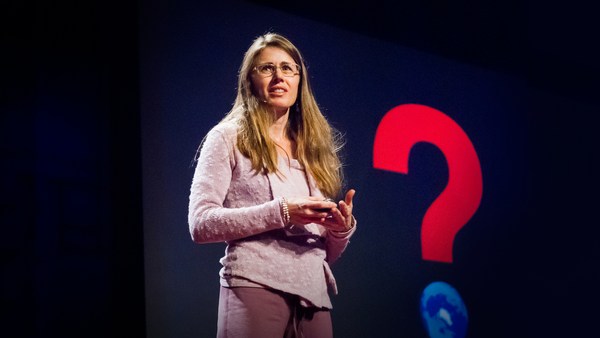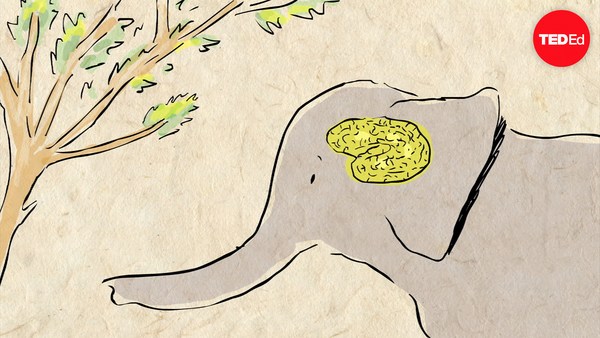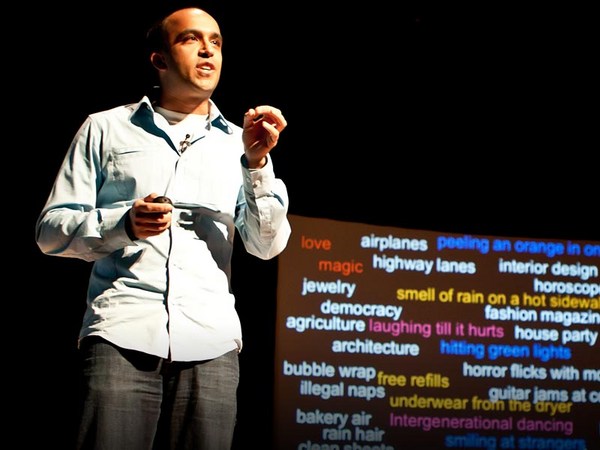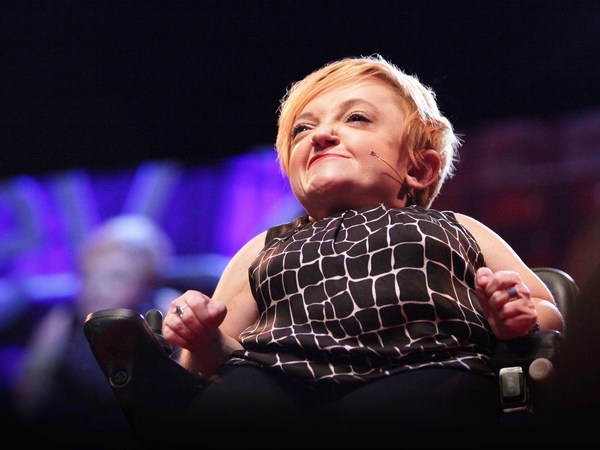Can any of you remember what you wanted to be when you were 17? Do you know what I wanted to be? I wanted to be a biker chick. (Laughter) I wanted to race cars, and I wanted to be a cowgirl, and I wanted to be Mowgli from "The Jungle Book." Because they were all about being free, the wind in your hair -- just to be free. And on my seventeenth birthday, my parents, knowing how much I loved speed, gave me one driving lesson for my seventeenth birthday. Not that we could have afforded I drive, but to give me the dream of driving.
And on my seventeenth birthday, I accompanied my little sister in complete innocence, as I always had all my life -- my visually impaired sister -- to go to see an eye specialist. Because big sisters are always supposed to support their little sisters. And my little sister wanted to be a pilot -- God help her. So I used to get my eyes tested just for fun. And on my seventeenth birthday, after my fake eye exam, the eye specialist just noticed it happened to be my birthday. And he said, "So what are you going to do to celebrate?" And I took that driving lesson, and I said, "I'm going to learn how to drive." And then there was a silence -- one of those awful silences when you know something's wrong. And he turned to my mother, and he said, "You haven't told her yet?" On my seventeenth birthday, as Janis Ian would best say, I learned the truth at 17. I am, and have been since birth, legally blind.
And you know, how on earth did I get to 17 and not know that? Well, if anybody says country music isn't powerful, let me tell you this: I got there because my father's passion for Johnny Cash and a song, "A Boy Named Sue." I'm the eldest of three. I was born in 1971. And very shortly after my birth, my parents found out I had a condition called ocular albinism. And what the hell does that mean to you? So let me just tell you, the great part of all of this? I can't see this clock and I can't see the timing, so holy God, woohoo! (Laughter) I might buy some more time. But more importantly, let me tell you -- I'm going to come up really close here. Don't freak out, Pat. Hey. See this hand? Beyond this hand is a world of Vaseline. Every man in this room, even you, Steve, is George Clooney. (Laughter) And every woman, you are so beautiful. And when I want to look beautiful, I step three feet away from the mirror, and I don't have to see these lines etched in my face from all the squinting I've done all my life from all the dark lights.
The really strange part is that, at three and a half, just before I was going to school, my parents made a bizarre, unusual and incredibly brave decision. No special needs schools. No labels. No limitations. My ability and my potential. And they decided to tell me that I could see. So just like Johnny Cash's Sue, a boy given a girl's name, I would grow up and learn from experience how to be tough and how to survive, when they were no longer there to protect me, or just take it all away. But more significantly, they gave me the ability to believe, totally, to believe that I could. And so when I heard that eye specialist tell me all the things, a big fat "no," everybody imagines I was devastated. And don't get me wrong, because when I first heard it -- aside from the fact that I thought he was insane -- I got that thump in my chest, just that "huh?" But very quickly I recovered. It was like that. The first thing I thought about was my mom, who was crying over beside me. And I swear to God, I walked out of his office, "I will drive. I will drive. You're mad. I'll drive. I know I can drive."
And with the same dogged determination that my father had bred into me since I was such a child -- he taught me how to sail, knowing I could never see where I was going, I could never see the shore, and I couldn't see the sails, and I couldn't see the destination. But he told me to believe and feel the wind in my face. And that wind in my face made me believe that he was mad and I would drive. And for the next 11 years, I swore nobody would ever find out that I couldn't see, because I didn't want to be a failure, and I didn't want to be weak. And I believed I could do it. So I rammed through life as only a Casey can do. And I was an archeologist, and then I broke things. And then I managed a restaurant, and then I slipped on things. And then I was a masseuse. And then I was a landscape gardener. And then I went to business school. And you know, disabled people are hugely educated. And then I went in and I got a global consulting job with Accenture. And they didn't even know. And it's extraordinary how far belief can take you.
In 1999, two and a half years into that job, something happened. Wonderfully, my eyes decided, enough. And temporarily, very unexpectedly, they dropped. And I'm in one of the most competitive environments in the world, where you work hard, play hard, you gotta be the best, you gotta be the best. And two years in, I really could see very little. And I found myself in front of an HR manager in 1999, saying something I never imagined that I would say. I was 28 years old. I had built a persona all around what I could and couldn't do. And I simply said, "I'm sorry. I can't see, and I need help." Asking for help can be incredibly difficult. And you all know what it is. You don't need to have a disability to know that. We all know how hard it is to admit weakness and failure. And it's frightening, isn't it? But all that belief had fueled me so long.
And can I tell you, operating in the sighted world when you can't see, it's kind of difficult -- it really is. Can I tell you, airports are a disaster. Oh, for the love of God. And please, any designers out there? OK, designers, please put up your hands, even though I can't even see you. I always end up in the gents' toilets. And there's nothing wrong with my sense of smell. But can I just tell you, the little sign for a gents' toilet or a ladies' toilet is determined by a triangle. Have you ever tried to see that if you have Vaseline in front of your eyes? It's such a small thing, right? And you know how exhausting it can be to try to be perfect when you're not, or to be somebody that you aren't?
And so after admitting I couldn't see to HR, they sent me off to an eye specialist. And I had no idea that this man was going to change my life. But before I got to him, I was so lost. I had no idea who I was anymore. And that eye specialist, he didn't bother testing my eyes. God no, it was therapy. And he asked me several questions, of which many were, "Why? Why are you fighting so hard not to be yourself? And do you love what you do, Caroline?" And you know, when you go to a global consulting firm, they put a chip in your head, and you're like, "I love Accenture. I love Accenture. I love my job. I love Accenture. I love Accenture. I love Accenture. I love my job. I love Accenture." (Laughter) To leave would be failure. And he said, "Do you love it?" I couldn't even speak I was so choked up. I just was so -- how do I tell him? And then he said to me, "What did you want to be when you were little?" Now listen, I wasn't going to say to him, "Well, I wanted to race cars and motorbikes." Hardly appropriate at this moment in time. He thought I was mad enough anyway. And as I left his office, he called me back and he said, "I think it's time. I think it's time to stop fighting and do something different." And that door closed. And that silence just outside a doctor's office, that many of us know. And my chest ached. And I had no idea where I was going. I had no idea. But I did know the game was up.
And I went home, and, because the pain in my chest ached so much, I thought, "I'll go out for a run." Really not a very sensible thing to do. And I went on a run that I know so well. I know this run so well, by the back of my hand. I always run it perfectly fine. I count the steps and the lampposts and all those things that visually impaired people have a tendency to have a lot of meetings with. And there was a rock that I always missed. And I'd never fallen on it, never. And there I was crying away, and smash, bash on my rock. Broken, fallen over on this rock in the middle of March in 2000, typical Irish weather on a Wednesday -- gray, snot, tears everywhere, ridiculously self-pitying.
And I was floored, and I was broken, and I was angry. And I didn't know what to do. And I sat there for quite some time going, "How am I going to get off this rock and go home? Because who am I going to be? What am I going to be?" And I thought about my dad, and I thought, "Good God, I'm so not Sue now." And I kept thinking over and over in my mind, what had happened? Where did it go wrong? Why didn't I understand? And you know, the extraordinary part of it is I just simply had no answers. I had lost my belief. Look where my belief had brought me to. And now I had lost it. And now I really couldn't see. I was crumpled. And then I remember thinking about that eye specialist asking me, "What do you want to be? What do you want to be? What did you want to be when you were little? Do you love what you do? Do something different. What do you want to be? Do something different. What do you want to be?" And really slowly, slowly, slowly, it happened. And it did happen this way. And then the minute it came, it blew up in my head and bashed in my heart -- something different. "Well, how about Mowgli from 'The Jungle Book'? You don't get more different than that." And the moment, and I mean the moment, the moment that hit me, I swear to God, it was like woo hoo! You know -- something to believe in. And nobody can tell me no. Yes, you can say I can't be an archeologist. But you can't tell me, no, I can't be Mowgli, because guess what? Nobody's ever done it before, so I'm going to go do it. And it doesn't matter whether I'm a boy or a girl, I'm just going to scoot.
And so I got off that rock, and, oh my God, did I run home. And I sprinted home, and I didn't fall, and I didn't crash. And I ran up the stairs, and there was one of my favorite books of all time, "Travels on My Elephant" by Mark Shand -- I don't know if any of you know it. And I grabbed this book off, and I'm sitting on the couch going, "I know what I'm going to do. I know how to be Mowgli. I'm going to go across India on the back of an elephant. I'm going to be an elephant handler." And I had no idea how I was going to be an elephant handler. From global management consultant to elephant handler. I had no idea how. I had no idea how you hire an elephant, get an elephant. I didn't speak Hindi. I'd never been to India. Hadn't a clue. But I knew I would. Because, when you make a decision at the right time and the right place, God, that universe makes it happen for you.
Nine months later, after that day on snot rock, I had the only blind date in my life with a seven and a half foot elephant called Kanchi. And together we would trek a thousand kilometers across India. (Applause) The most powerful thing of all, it's not that I didn't achieve before then. Oh my God, I did. But you know, I was believing in the wrong thing. Because I wasn't believing in me, really me, all the bits of me -- all the bits of all of us. Do you know how much of us all pretend to be somebody we're not? And you know what, when you really believe in yourself and everything about you, it's extraordinary what happens.
And you know what, that trip, that thousand kilometers, it raised enough money for 6,000 cataract eye operations. Six thousand people got to see because of that. When I came home off that elephant, do you know what the most amazing part was? I chucked in my job at Accenture. I left, and I became a social entrepreneur, and I set up an organization with Mark Shand called Elephant Family, which deals with Asian elephant conservation. And I set up Kanchi, because my organization was always going to be named after my elephant, because disability is like the elephant in the room. And I wanted to make you see it in a positive way -- no charity, no pity. But I wanted to work only and truly with business and media leadership to totally reframe disability in a way that was exciting and possible. It was extraordinary. That's what I wanted to do. And I never thought about noes anymore, or not seeing, or any of that kind of nothing. It just seemed that it was possible.
And you know, the oddest part is, when I was on my way traveling here to TED, I'll be honest, I was petrified. And I speak, but this is an amazing audience, and what am I doing here? But as I was traveling here, you'll be very happy to know, I did use my white symbol stick cane, because it's really good to skip queues in the airport. And I got my way here being happily proud that I couldn't see. And the one thing is that a really good friend of mine, he texted me on the way over, knowing I was scared. Even though I present confident, I was scared. He said, "Be you." And so here I am. This is me, all of me.
(Applause)
And I have learned, you know what, cars and motorbikes and elephants, that's not freedom. Being absolutely true to yourself is freedom. And I never needed eyes to see -- never. I simply needed vision and belief. And if you truly believe -- and I mean believe from the bottom of your heart -- you can make change happen. And we need to make it happen, because every single one of us -- woman, man, gay, straight, disabled, perfect, normal, whatever -- everyone of us must be the very best of ourselves. I no longer want anybody to be invisible. We all have to be included. And stop with the labels, the limiting. Losing of labels, because we are not jam jars. We are extraordinary, different, wonderful people.
Thank you.
(Applause)



